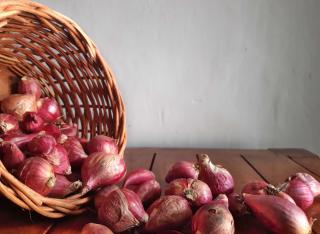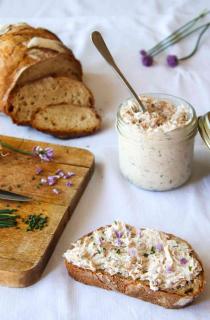

Shallot is a spice plant that offers many health benefits and significant therapeutic value.
Known scientifically as Allium ascalonicum, it belongs to the same family as onions, garlic and chives, the Alliaceae family.
There are several different shallot varieties. The very tasty gray shallots like the ‘Griselle’ or the ‘Grisor’, pink shallots like the ‘Bretor’, ‘Delvade’ or ‘Ronde de Jersey’, and finally red shallots.
Shallots are mostly grown in oceanic climates.
Available all year long, shallot is embedded into the art of French gastronomy and can spice all your dishes and meals.
Moreover, this vegetable is extremely beneficial for health.
Shallot is native to the Mediterranean area.
It used to be called the “Ascalon onion”, after its namesake city in Palestine.
Ultimately, shallot traveled by and far to Egypt and Persia where it was considered sacred long before the christian era.
It arrived in Western Europe thanks to the Crusaders and was cultivated in Brittany towards the XIIth century.

Fiber-rich shallot eases intestinal transit and consequently digestion. Besides, it is also easily digestible, ideal for lazy intestines. Not so fatty and with a low calorie count, it is also an ally in your war on extra pounds.
Shallot is also a diuretic. 80% of it is water.
Indeed, shallot contains flavonoids which are active antioxidants against free radicals. Shallot thus protects our cardio-vascular system in that it lowers bad cholesterol levels, LDL, and at the same time inhibits it from depositing itself on our artery linings. This reduces the risk of cardiovascular diseases appearing, such as stroke and atheromatous plaques.
For the heart, shallot reinforces the myocardium and helps avoid heartbeat disorders.
Antioxidant properties of vitamin C are widely documented.
This vitamin protects our body from the degrading impact of free radicals. It especially stimulates the immune system in case of infection.
Shallot is also known to have antibacterial and antioxidant properties.
Shallot is the source of many other antioxidants (such as vitamin A). These block premature ageing of cells and skin and protect against the onset of various cancers.
Shallot has anti-inflammatory properties, too, especially useful in case of allergy, and also has anti-microbial activity which is effective in winter when our body is vulnerable.
Even anti-fungus effects have been demonstrated, which inhibit growth of fungus and mushrooms.
Eating shallot is also beneficial to bone growth.
Shallot provides vitamin B, which is involved in the nervous system and pro-vitamin A, beta-carotene.
Shallot is a source of many minerals and trace elements:
Shallot is clearly a boon for body health. It also works wonders for your appearance, too.

Never an afterthought, shallots can spice up your dishes with virtually no added calories. It fits right in to any healthy diet. Its main appeal is its taste, both soft and spicy.
Shallot can be eaten raw or cooked. However, eating shallot raw might make some persons feel uncomfortable. And if cooked, a lot of its nutritional value is lost.
Shallot adds flavor to your mixed salads, sauces (especially Bearnaise) and also salad dressings.
It also pairs well with tartar beef. It blends seamlessly into omelet, quiche and ratatouille.
For fans of raw oysters: add wine vinegar to thinly minced raw shallot.
Sauteed with a dash of butter, to pair with your autumn mushroom harvest.
Sliced shallot flavors your foil-baked fish or your tzatziki.
Shallot contains vitamin A, which brings hefty benefits to the skin and its cells. It ensures skin plasticity and cell regeneration.
For hair, massage the scalp with shallot juice to eliminate dandruff and stimulate hair growth.
Keeping shallots – At room temperature for a couple weeks. Gray shallot doesn’t keep as long.